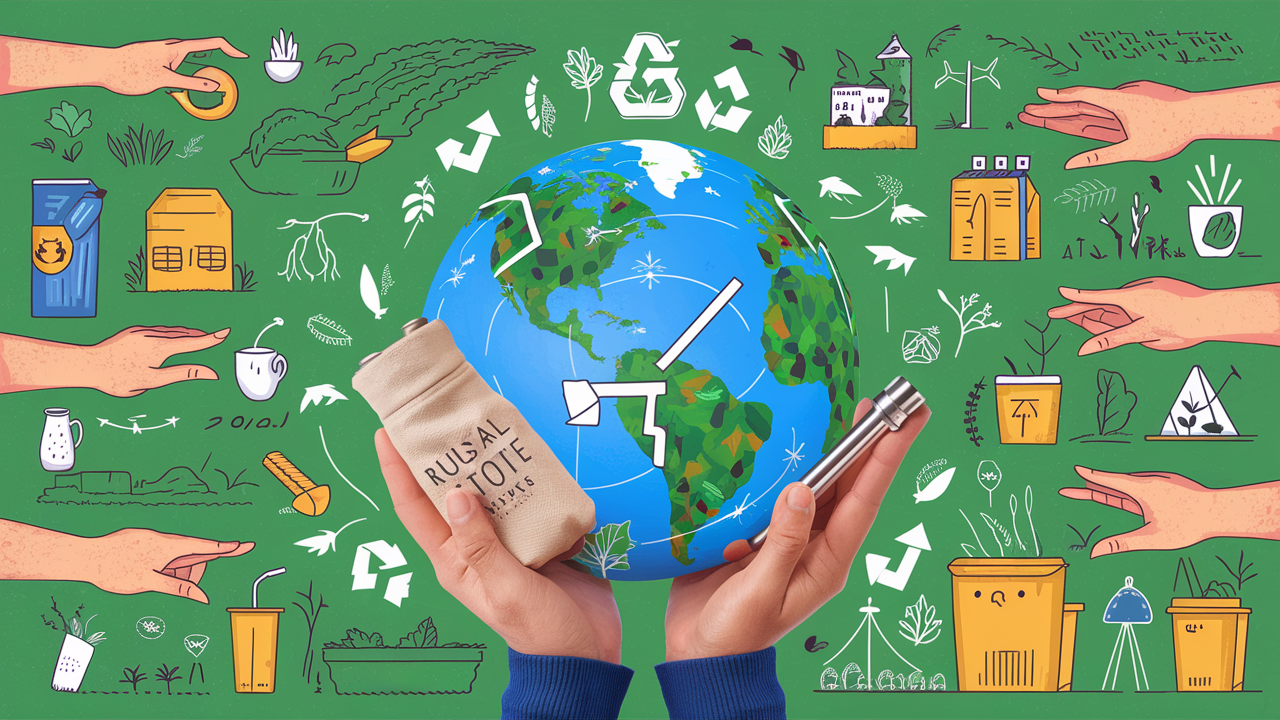Zero Waste Lifestyle: A Practical Guide to Sustainable Living

In an era where environmental consciousness is paramount, adopting a zero waste lifestyle stands as a beacon of hope. It’s not just a trend. But a sustainable solution to combat the looming crisis of waste accumulation. In this guide, we delve into the essence of a zero waste lifestyle, exploring its significance, principles, and practical applications.
The world is drowning in waste, with landfills overflowing and oceans suffocating under the weight of our discarded items. Plastic pollution, in particular, has reached alarming levels, posing a grave threat to ecosystems and human health. In this context, embracing a zero waste lifestyle emerges as a crucial imperative, offering a tangible way to mitigate our environmental footprint and pave the path towards a more sustainable future.
What Is Zero Waste?
Zero waste is not merely a goal but a philosophy. A way of life centered around minimizing waste generation and maximizing resource efficiency. At its core, zero waste aims to send nothing to landfills or incinerators, instead opting for practices that promote reuse, recycling, and composting.
Unlike conventional waste management approaches that primarily focus on end-of-pipe solutions like recycling. Zero waste transcends this paradigm by prioritizing waste prevention. It encourages a shift in mindset. Challenging individuals and communities to rethink consumption patterns, minimize packaging, and embrace sustainable alternatives.
Benefits of Adopting a Zero Waste Lifestyle



The decision to embrace a zero waste lifestyle transcends individual actions; it’s a commitment to collective well-being and environmental stewardship. In this section, we delve into the multifaceted benefits that arise from adopting this transformative approach, spanning health, economic, and ecological realms.
1. Health Benefits:
By prioritizing fresh, unpackaged foods and eschewing single-use plastics. Individuals embarking on a zero waste journey often experience notable improvements in their health. Reduced exposure to harmful chemicals found in plastic packaging and processed foods can contribute to enhanced well-being and vitality.
Moreover, embracing sustainable practices such as composting organic waste fosters. A deeper connection to nature and promotes outdoor activities like gardening, which in turn can boost mental and physical health.
2.Economic Savings:
Contrary to popular belief, sustainable living doesn’t have to break the bank. In fact, transitioning to a zero waste lifestyle can yield substantial cost savings over time. By eschewing disposable products and opting for reusable alternatives, individuals can significantly reduce their expenditure on household items and groceries.
Furthermore, embracing principles of minimalism and conscious consumption encourages thoughtful purchasing decisions, leading to a more streamlined and budget-conscious lifestyle.
3.Reduced Carbon Footprint:
Perhaps the most compelling benefit of adopting a zero waste lifestyle lies in its capacity to mitigate climate change and reduce carbon emissions. The production, transportation, and disposal of single-use plastics and other non-biodegradable materials contribute significantly to greenhouse gas emissions and environmental degradation.
By minimizing waste generation, recycling materials, and supporting circular economy initiatives, individuals and communities can play a pivotal role in combating climate change and preserving precious natural resources for future generations.
Practical Tips for Going Zero Waste
Embarking on the journey towards a zero waste lifestyle may seem daunting at first, but with mindful choices and small changes, it becomes an attainable and rewarding endeavor. In this section, we offer practical tips and actionable strategies to help you reduce waste, minimize environmental impact, and embrace a more sustainable way of living.
- Reduce Single-Use Plastics
The ubiquity of single-use plastics poses a significant challenge to environmental sustainability. To combat this, opt for reusable alternatives whenever possible. Replace plastic bags with sturdy cloth totes, plastic bottles with durable stainless steel ones, and disposable utensils with reusable bamboo or metal options. Investing in items like stainless steel straws and cloth produce bags can further reduce reliance on disposable plastics in daily life.
- Composting and Food Waste
Composting is a cornerstone of zero waste living, transforming organic waste into nutrient-rich soil amendments for gardening and landscaping. Start by designating a composting area in your backyard or explore indoor composting options for smaller living spaces. Utilize kitchen scraps, yard trimmings, and biodegradable materials to create a thriving compost ecosystem that enriches the soil and reduces landfill waste.
- Mindful Shopping
Adopting a zero waste lifestyle entails reevaluating our consumption habits and making informed choices as consumers. Opt for bulk shopping whenever possible, utilizing reusable containers to minimize packaging waste. Explore secondhand stores and local markets for sustainable shopping alternatives, prioritizing quality over quantity in all purchases. By supporting local businesses and embracing mindful consumption, we can reduce waste and foster a more resilient community.
- DIY Cleaning and Personal Care Products
Transitioning to homemade cleaning and personal care products not only reduces waste but also minimizes exposure to harmful chemicals found in commercial alternatives. Experiment with simple recipes using household ingredients like vinegar, baking soda, and essential oils to create effective cleaners, toiletries, and skincare products. Embrace the creative process of DIY formulations while prioritizing sustainability and environmental stewardship.
- Minimalism and Decluttering
Minimalism and zero waste living share common values of simplicity, intentionality, and mindful consumption. Embrace the principles of minimalism by decluttering your living space, letting go of excess possessions, and prioritizing experiences over material possessions. Cultivate a deeper appreciation for the things that truly matter, fostering a lifestyle that is aligned with your values and aspirations.
Overcoming challenges
Transitioning to a zero waste lifestyle is a commendable endeavor, but it’s not without its challenges. From navigating social situations to managing waste while traveling, various obstacles may arise along the way. However, with willpower and creativity, these challenges may be conquer.
Acknowledging Challenges
It’s important to acknowledge that the journey towards zero waste may encounter hurdles. Social events often revolve around disposable items, making it challenging to adhere to sustainable practices. Similarly, travel presents unique obstacles, with limited access to recycling facilities and an abundance of single-use plastics.
Practical Solutions
Despite these challenges, there are practical solutions that can help navigate these situations. When attending social events, consider bringing your own reusable items such as a water bottle, utensils, and containers for leftovers. Politely decline single-use items and explain your commitment to reducing waste, sparking conversations about sustainability in the process.
While traveling, plan ahead by packing essentials like a reusable water bottle, cloth bags, and a travel-friendly utensil set. Seek out accommodations that prioritize sustainability and explore local markets for package-free options. By being proactive and resourceful, it’s possible to maintain zero waste principles even while on the go.
Conclusion
As we reach the conclusion of our exploration into the world of zero waste living, it’s essential to reflect on the myriad benefits and transformative potential of this sustainable lifestyle. From health and economic savings to environmental stewardship, the advantages of adopting a zero waste lifestyle are vast and far-reaching.
Recap of Benefits
By prioritizing waste reduction, composting, mindful shopping, DIY alternatives, and minimalism, individuals can experience improved health, financial savings, and a reduced carbon footprint. Through conscious choices and sustainable practices, we can collectively work towards a healthier planet and a more resilient future for generations to come.
Encouragement for Action
While the concept of zero waste may seem daunting, it’s important to remember that every small step towards reducing waste counts. Whether it’s refusing single-use plastics, composting kitchen scraps, or supporting local businesses, each action contributes to a larger movement towards sustainability.
As you embark on your own journey towards a zero waste lifestyle, remember that progress, not perfection, is key. Celebrate your successes, learn from your challenges, and continue to seek out opportunities for growth and improvement. Together, we have the power to create meaningful change and build a more sustainable world for ourselves and future generations.
